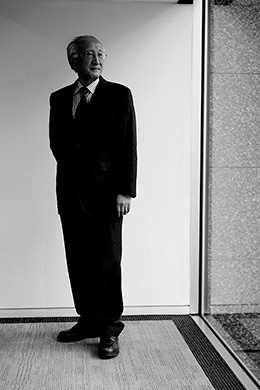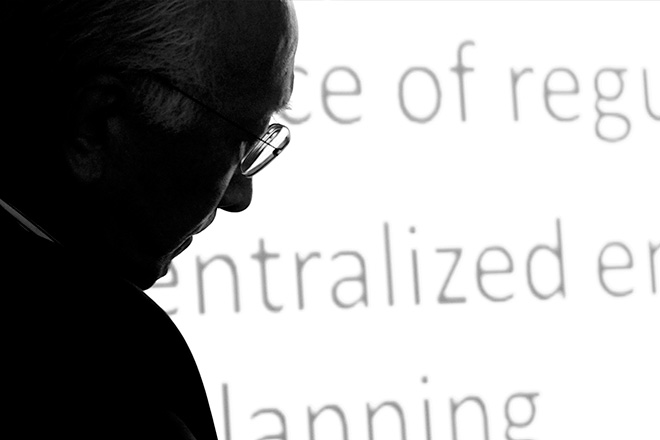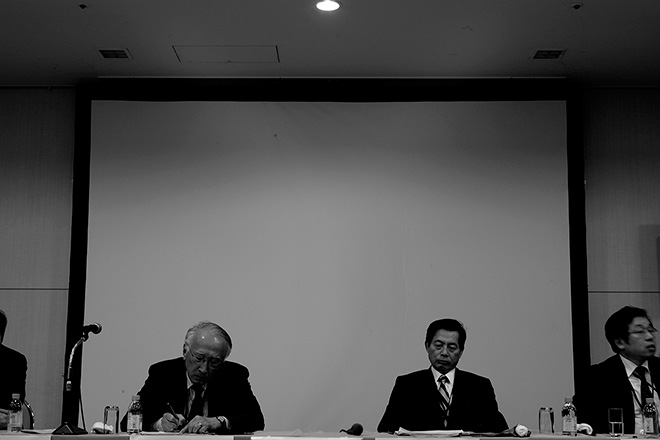Energy Technology and Public Policy
Nobuo Tanaka / The University of Tokyo, Graduate School of Public Policy

Q: What are the characteristics of trends surrounding global energy problems?
Tanaka: Since the Fukushima nuclear power plant accident in particular, there has been extensive political debate in Japan regarding energy problems and whether nuclear power is safe or not. Public anxiety is also a factor; so instead, the debate is focused on to what extent dangerous nuclear power should be used.
Certainly when it comes to determining how to handle nuclear power, we have to consider safety in particular. However, the truth is that rather than calculating backwards, we need to consider the global energy market, how exactly energy demands are transitioning and where, how we are supplying energy to meet those demands, and where the risks are.
To put it another way, what we should be debating is, in order to reduce those risks as much as possible, what types of energy sources and energy compositions will guarantee our energy security. Also, because energy is of course an extremely essential core element in our nation’s economy, we should also be debating what the best method is for procuring that energy for our nation.
Right now, energy policy should take into consideration these points for gas, nuclear power, and coal, and from there, another very important area to consider is how we are going to guarantee a stable supply of oil, which we now import in large volumes from the Middle East. Without a stable supply, the price fluctuates up and down significantly.
With all of these points in mind, Japan needs to consider what type of energy mix would be best and how that energy mix should be handled. I think this is extremely important when it comes to devising energy policy.
Q: In addition to the methods for power generation, how will the methods for power supply, the methods for power usage, and the power transmission grid change in Japan in the future?
Tanaka: Of course, electric power involves power transmission technology, and a variety of other power related technologies, and right now there is a debate about nuclear power being a base load power source. However, in addition, we must also use new renewable energies.
The biggest problem with renewable energy and especially with solar power and wind power is, in short, the extreme fluctuations in the amount of power that is generated. If the wind is blowing and then stops, the amount of wind power that is generated of course changes.
The issue with solar power is that sunlight disappears when it’s cloudy or raining, and of course at night, and these types of fluctuating power supplies will increase with the increase in renewable energies.
As that occurs, we need to determine how we are going to provide a backup power supply. We have to decide what the best option is for backup power, whether it be for example, hydroelectric power, or the use of gas turbines, or a combination thereof, because without backup power, we won’t be able to provide a stable supply of electric power.
Therefore, we must also improve the electric power market. From there, we also have to make certain that we have new power transmission technologies in place and that we connect power transmission lines to those new energy sources. This of course will require an investment in equipment, and it can’t be accomplished by simply increasing wind power generation alone for example.
I believe that we have reached a point in time in which we must develop a new concept to guarantee energy security.

Q: What type of human resources will be needed to develop a new energy system?
Tanaka: That is of course a good question. When we discuss that issue at our graduate school, we consider what types of human resources are required, and recognize that those human resources must have an understanding of technology because various technologies are of course required. And because this is a problem relating to the national system, they also need to understand how to produce that system.
From there, another important element is learning all we can from various international perspectives including what types of examples exist overseas. There are of course many cases that have failed and many that have been successful, so it is important that we learn all we can from those cases and gain knowledge about those examples. From that perspective, I think foreign language skills are also very important.
From there, people working in this area will be responsible for developing systems in Japan moving forward, and to do that, they will have to be able to connect in particular industries, people responsible for government policies, and academics, so a wide variety of capabilities will be required. They need to not only be energetic but to also have an understanding of all of these areas and to have good communication skills, which are extremely important because they need to be able to determine how to best convey information to the people so that the people understand and are satisfied with what they are told.
Of course, I test the presentation capabilities and communication capabilities of my students because I do believe that these types of skills will become even more important moving forward.

Q: The Fukushima accident was of course just one major event with regards to energy, but what are the strengths and weaknesses of Japan in this area?
Tanaka: As for Japan’s strengths and weaknesses, well, the weakness of Japan as a nation in the area of energy is quite simple. It is that we are a nation with absolutely no resources, and as a nation without resources, we of course have to rely on imports. There are a variety of methods for importing.
However, because Japan is a nation with such an advanced economy, obtaining a stable supply of energy is particularly important, so Japan has made significant efforts to determine how to obtain a stable supply while increasing our competitive strength.
Until the first oil shock, Japan’s course had been that of gulping down oil to achieve successful growth. However, because of that oil shock, from a certain perspective, Japan was forced to change its course, and as a result, we became a nation focused on energy conservation.
Of course, as a result of successfully overcoming that crisis, Japan was able to skillfully use that event and turn the potential disaster to its advantage, and because of that history, I believe the same thing can apply to the Fukushima disaster as well. It has resulted in a dreadful crisis for us today.
However, there is probably a method that can be used to turn this dreadful crisis into something good, and just like Japan did during the oil shock; we need to discuss what should be done to overcome this crisis as well. I believe our only option is to pinpoint the problem and broadly discuss what our options are as a people in order to overcome this crisis as well.
